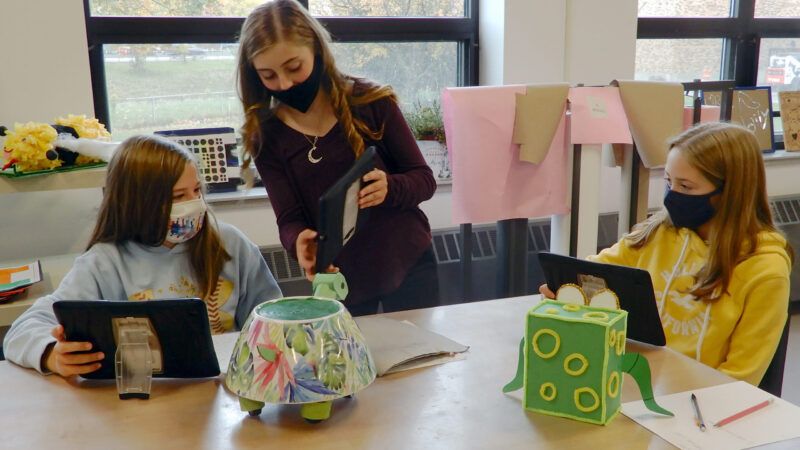This Psychologist Thinks Mask Mandates in Schools 'Offer Distinctive Opportunities for Learning and Growth'
Writing in The New York Times, Judith Danovitch also argues that masks inhibit nail biting and nose picking.

The usual argument for requiring K–12 students to wear face masks, regardless of their vaccination status, is that such mandates are necessary to prevent COVID-19 outbreaks and keep the infection rate in schools low. In a New York Times essay published yesterday, University of Louisville research psychologist Judith Danovitch takes the case for "universal masking" in schools a step further, boldly arguing that forcing students to cover their faces all day actually helps them learn.
That claim is counterintuitive, to say the least. As many critics have noted, masks make it harder to understand and be understood, both by muffling speech and by concealing facial cues on which humans rely to communicate, which is especially burdensome for younger children who are still learning that skill. Masks interfere with the social interaction that for many students is one of the few bright spots in an otherwise dreary and draining day. Masks make it harder to breathe by obstructing the nose and mouth and harder to see by fogging eyeglasses. They make ears hurt and faces itch. The inconvenience and discomfort caused by mask mandates, coupled with the stress of enforcing and complying with them, add new distractions and anxieties to restrictive environments that were already unpleasant in many ways.
Danovitch says parents' concerns about the impact of face masks on communication skills are "understandable but unwarranted," since "children in cultures where caregivers and educators wear head coverings that obscure their mouths and noses develop skills just as children in other cultures do." Furthermore, "even congenitally blind children—who cannot see faces at all—still learn to speak, read and get along with other people."
Danovitch concedes that "masks are inconvenient, uncomfortable and bothersome." But "as long as they are needed," she says, "we should take advantage of the fact that they offer distinctive opportunities for learning and growth."
How so? By obscuring the lower half of people's faces, Danovitch says, masks force students to focus on the eyes, which is "at least as important as looking at mouths to understand whom you are looking at and what they are trying to convey." Masks also enhance the importance of other cues, such as context, gestures, body language, and prosody (e.g., the intonation, stress, and rhythm of speech). Mask mandates therefore can help sharpen children's ability to decode those elements of communication, Danovitch suggests. This supposed silver lining is similar to arguing that forcing children to wear blindfolds all day, by depriving them of sight, can sharpen their other senses, which is probably true but nevertheless does not seem like a compelling argument for such a policy.
Danovitch adds that mask mandates can "help teach children to pay more attention to their own bodies." So would forcing them to carry 50-pound weights, eliminating lunch breaks, or banning restroom visits.
Danovitch also thinks mask mandates improve self-discipline, especially in younger children. "Keeping a mask on over the course of a school day involves the kind of self-control and self-regulation that many children find challenging," she writes. "Younger children must inhibit the urge to pull off their mask, and older children must be mindful of when their mask is slipping down or when it's OK to take it off….Research on self-control and self-regulation suggests that children who master the skills needed to keep their masks on will grow up to be better at achieving their long-term goals, solving problems and handling stressful situations."
Some might argue that the urge to pull off your mask (which is by no means limited to "younger children") is a signal of physical distress rather than a lack of discipline. And what Danovitch describes as "self-control" and "self-regulation" is actually the habit of doing as you're told, even when your body rebels.
While it's true that schools accustom children to following the sort of annoying rules they will frequently encounter in their adult lives, that is hardly an unalloyed good. Students who are trained to obey when they encounter invasive and indiscriminate search policies supposedly aimed at making schools safer, for example, are apt to be submissive as adults when they encounter police officers who overstep their authority. Children who are conditioned to accept arbitrary impositions in school are less likely to challenge them as adults. And while that might make them more patient in long DMV lines or more tolerant of security theater at the airport, there is a cost to getting along by going along.
Danovitch's comical insistence on seeing secondary, character-building benefits from the rigors of mask mandates reeks of desperation. She even argues that masks inhibit nail biting and nose picking. I am not making that up.
In the same spirit, one can think of other advantages. Masks make it easier to verify whether you have bad breath, for instance, and they conceal pimples on much of your face. They thereby alleviate major adolescent anxieties. And for rebellious teenagers, masks make it easier to discreetly chew gum or use smokeless tobacco.
I would say that Danovitch is trying to make a virtue of necessity, except that the necessity remains unproven, which is the heart of the bitter debate about mask mandates in K–12 schools. If you think universal masking in schools is the only way to avoid a large number of COVID-19 deaths that would otherwise occur, you will be inclined to support that policy. But if you doubt that's true, based on pre-vaccination experience with COVID-19 outbreaks in schools and the weak evidence offered by mandate enthusiasts, the possibility that requiring masks might offer "distinctive opportunities for learning and growth" will not sway you.


Show Comments (138)